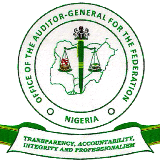This article needs additional citations for verification .(September 2018) |
 | |
| Constitutional Body overview | |
|---|---|
| Formed | 1910 |
| Jurisdiction | Federal Government of Nigeria |
| Headquarters | Abuja, Nigeria |
| Constitutional Body executive |
|
| Website | oaugf.ng |

Office of the Auditor General for the Federation (OAuGF) is a constitutional body and the Supreme Audit Institution of Nigeria. [1] [2]
Contents
It derives its mandate from the 1999 Constitution of the Federal Republic of Nigeria, as amended (Sections 85 and 86).
The Auditor-General is empowered to undertake audits of all income and expenditure of the Federal Government of Nigeria. However, the Constitution prohibits the Auditor-General from auditing the accounts of “government statutory corporations, commissions, authorities, agencies, including all persons and bodies established by an Act of the National Assembly.” As a result, the Office of the Auditor-General for the Federation cannot audit the financial statements of parastatal organizations, although it can undertake periodic checks in such state-owned entities. The meaning of periodic checks in the context of the Constitution has not been properly defined since no accounting /auditing book has ever defined what a periodic check represents.
The mandate of the Office of the Auditor-General for the Federation is also restricted to the audit of Federal bodies. Each of the 36 states of Nigeria has two Auditors-General, one for the audit of state institutions and the other for the audit of local governments within the state. In total, there are 73 Auditors-General in Nigeria, more than the whole of the rest of Africa put together. However, nothing in the present legislation precludes the Auditor General for the Federation from tracing Federal public monies to any state of the Federation. [3]